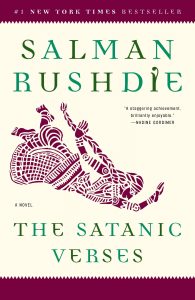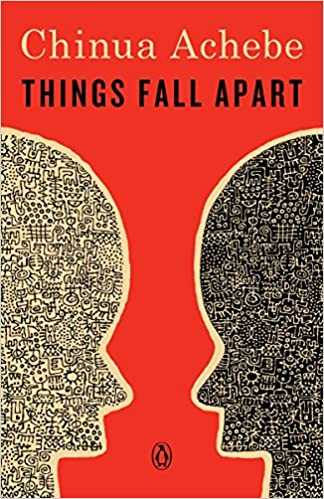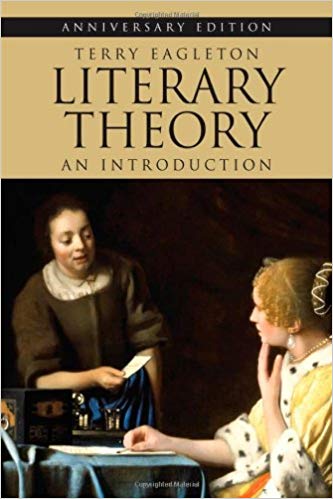M, W 2:00-3:20
Classroom: LANG 302
My Office: LANG 408D; My Email: mraja@unt.edu
Office Hours: M, W 10:00-12:00 and by Appointment
Final Exam Questions
ENGL 2440. Banned Books
Spring 2020
Due Date: May 7, by NOON either through Canvas or through direct email to me: mraja@unt.edu
Please answer all questions (at least two double paced typed pages for each question).
Cite from the novel to argue your points.
Follow the MLA citation system
Question One:
In the novel The Satanic Verses Rushdie creates two characters (Gibreel and Saladin) who seem to be exact opposites of each other, but only one of them has a sort of a happy ending. What causes could be gleaned from the novel that enables Saladin to survive the experience and make a positive change to his life.
Question 2:
In your own words, please discuss what makes Gibreel into a character destined to self destruct.
Question 3:
Relying on what you learned in the class, discuss three instances in the novel that would have been highly offensive to Muslims. Please also explain why these instances would be offensive?
Question 4:
How has reading this novel enabled you to approach cultural difference specially in seeing the world from the point of view of people from different cultures and religions?
Question 5:
What is the main lesson we learn about faith, religious and other, and what do you thing Rushdie offers as opposite of faith. Please discuss using specific passages from the book.
Question 6:
As American University students, do you think it is necessary to at least know the basics of other cultures and religions in order to really understand literary texts that draw on non-European cultures. If so, how has this book helped you enhance your knowledge of cross cultural understanding.
Course Plan from now until the end of the semester:
Livestream links:
Apr 27
April 20:
https://youtu.be/Mf6MhcICoW4
April 22
https://youtu.be/pUVcnBAgYNo
Copy of My email:
In the face of the COVID-19 pandemic, the College of Liberal Arts and Sciences is committed to your academic success, while protecting the health and safety of UNT students, faculty and staff. It is my goal to ensure that the restrictions placed on us by the pandemic do not negatively affect your experience in mu course.
To ensure the continuity of learning, all instruction and associated instructional activities for ENGL 4150 will be online until the end of the spring 2020 semester. Please keep an eye on the course web page for any updates:
https://postcolonial.net/2019/10/engl-2440-banned-books-s-2020/
- All course announcements will be posted on the web page. I understand that some students may not have access to their textbooks due to travel restrictions placed by COVID 19. I will try to provide recommendations for alternative educational resources that are available on-line, whenever possible.
- We will have synchronous (live) class meetings during the regular class meeting times through a private livestream on my YouTube channel. I will send you the link to the livestream through your campus email and will also post it on the course webpage. Please note, that the recorded versions of these sessions will also be available and I will send you a private link if you need it. The live sessions allow questions and comments through a chat box, so please feel free to post your comments and questions.
Exams:
I have decided to cancel our midterm exams (the total points for the exam will be added to your grade total) and we will now only administer a take-home final exam. I will send you the questions for the Final Exam a week before it is due and you will be able to submit it through the course CANVAS site or through my email: mraja@unt.edu..
- For the rest of the semester, your attendance/class participation will be evaluated based on your participation in livestream sessions.
- The course schedule and assignment deadlines have been adjusted to account for class cancellations during the week of March 16-22. Such adjustments will be reflected on the course web page
- I will hold virtual office hours and can talk/ text you through WhatsApp. Please email me if you need to talk to me and we can exchange the contact information.
- I will announce any additional changes to course delivery, including unexpected cancellations, on course webpage.
I hope that we will be able to have a very productive rest of the semester in spite of the COVID-19 health emergency. However, I recognize that this is an adjustment for all of us and I appreciate everybody’s flexibility and understanding as we make adjustments to the course delivery format. If you have any concerns about your ability to complete your course work due to health, family or other reasons, please let me know as soon as possible, and I will do my best to help you find the best solution.
Introduction
The publication of Salman Rushdie’s The Satanic Verses (1989) unleashed a scandal of global proportions and accentuated the global cultural divide between  those who believe in absolute freedom of expression and those who assert that their spiritual (in this case Islamic) beliefs should also be protected from acts of epistemic transgression.
those who believe in absolute freedom of expression and those who assert that their spiritual (in this case Islamic) beliefs should also be protected from acts of epistemic transgression.
The publication of the novel also caused what is now called the Rushdie Affair which involved a fatwa against the author by Ayatollah Khomeini of Iran resulting in death threats to the author.
This course will encourage you to read the book carefully and then offer supplementary materials in order to understand as to what made the book so transgressive and controversial.
Required Texts:
Rushdie, Salman. The Satanic Verses [Any edition will be fine]: SV.
Class Reader [Provided by the Instructor]
Course Policies and Requirements:
Students are expected to come prepared for class: This involves reading the assigned texts, listening carefully to their peers, and contributing their views in a collegiate and stimulating way. Attendance is mandatory.
Distribution of Points:
Response Journals 100 Points
Mid-Term Exam 200 Points
Group Presentations 300 Points
Participation 100 Points
Final Exam 300 Points
Total 1000 Points
YOU MUST COMPLETE ALL MAJOR ASSIGNMENTS TO PASS THE COURSE!
Response Journals (100 Points): Every week you will turn in a journal responding to the readings assigned for the week. Mostly, the journals can either offer your insights about the assigned readings or (also) add some questions that might arise during your reading. The journal should be minimum two pages, double-spaced, font 12 Times.
Mid-Term Exam (200 Points)
The Mid-term will be given in the eighth week. The exam will include three essay questions. I will give you a comprehensive study guide a week before the exam.
Group Presentations (300 Points)
In the first week, your class will be divided into small groups who will then choose their presentation topics.
- Your presentations will be for one whole class period.
- Feel free to pass out any handouts that you require.
- You must use Powerpoint.
- Each group member must present their own separate part as part of the group presentation..
- You must turn in a THREE page write up of your part of the presentation
- A good presentation will encourage class participation and class discussion.
Presentation Topics and Dates:
- Indian Culture (Monday 2/ 17)): Avery, Amy, Elliot, Jordyn
- Early History of Islam (Monday 2/24): Lauren, Kendall, Catherine, Laura, Aislinn, Miranda, Amy R.
- Bollywood: (2/26): Jake, Gianni, Aaliyah, Bryce
- Rushdie Affair: Western Response (03/02): Nathan, Jason O
- Rushdie Affair: Muslim Response (03/04)Noelle, Morgan, Katherine C, Isabelle, Kadazsha, Will
Final Exam (300 Points) [Final Exam Questions] A cumulative final exam will be administered in-class on the date mentioned in the UNT exams program.
Class Participation (100 Points)
As this is a discussion format class, your thoughtful participation is essential to the success of the class. I encourage collegiate, open, and thought-provoking class discussions. Remember, we are all here to learn, so let us share our ideas and knowledge to make this class into a dynamic learning experience. I encourage you to speak-up in the class, not just about the texts but also if you have any suggestions about how to improve our learning during the course.
Attendance
You are expected to attend the class regularly. You will be in the danger of failing the course if you miss more than FOUR class sessions.
Plagiarism
Plagiarism is against the law, and will result in automatic failure in the course. Simply stated, plagiarism is when you try to pass anyone else’s work as your own or if you turn in your own work written for another class.
Please review UNT Policy on Academic Integrity for details.
ADA
If you have a disability, please contact the campus ADA office and bring me the necessary documentation. I will try my best to accommodate you if you need any special instruction or assistance.
SENATE BILL 11 (“CAMPUS CARRY”). Students must read UNT’s policy on concealed handguns on campus, which I’ve posted on Blackboard (or see http://campuscarry.unt.edu/untpolicy.) Here I note that 1) only licensed persons may legally carry handguns on campus, and 2) this right only authorizes the licensed carrying of “handgun[s], the presence of which is not openly noticeable to the ordinary observation of a reasonable person.” Per policy, if a gun is “partially or wholly visible, even if holstered,” it’s not legal on campus, whether or not it’s licensed. I report all illegal activities to the UNT police, regardless of their nature.
“ACTIVE SHOOTER SITUATIONS.” All students should be aware of UNT’s guidelines for responding to “active shooter situations” (seehttp://emergency.unt.edu/get-prepared/Active-Shooter).
Grading Scale:
A 900-1000
B 830-899
C 739-829
F Less than 600 Points
Important Note: If at any stage in this course you feel like I could tweak my teaching practices to make it a better learning experience for you, please come and talk to me. If you are not comfortable talking in person, you can leave me a typed anonymous note with your suggestions in my mailbox in the English main office.
Weekly Schedule
Note: This is a tentative schedule. I may change this schedule during the semester. You will be informed of the changes well in advance, but it will be your responsibility to keep any such changes in mind while preparing for the class.
The assigned readings are for the whole week. Generally, we will discuss the assigned readings, spread over the week, in the order in which they are listed below. YOU ARE EXPECTED TO HAVE READ THE ASSIGNED TEXTS OVER THE WEEKEND.
Discussion: SV Part 1
Reading:
SV Part 2; Raja. “Democratic Criticism and the Importance of Islamic Hermeneutics of Reading in the Twenty-First Century.” South Asia: Journal of South Asian Studies Vol. 36 (3) 2013: 449-464. (Handout)



[…] 4150-001: Lit Criticism, S 2020 Previous Next […]